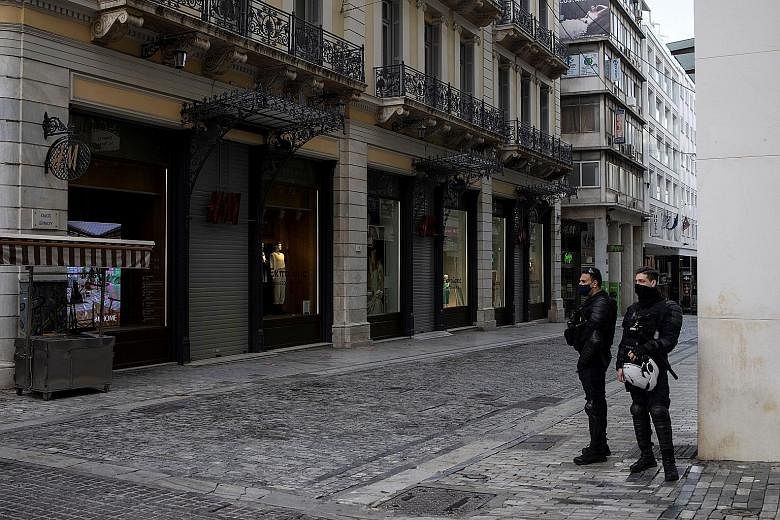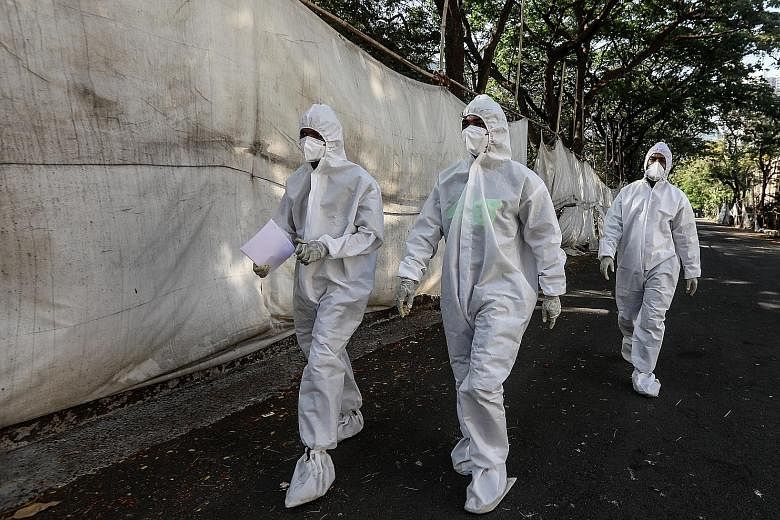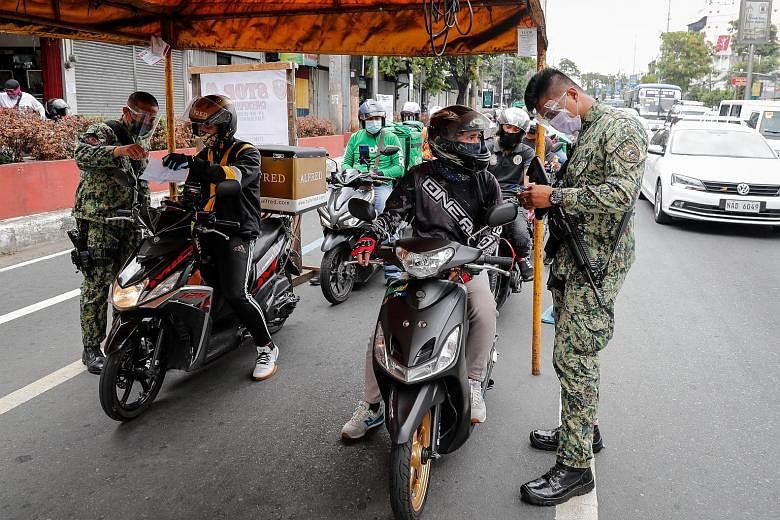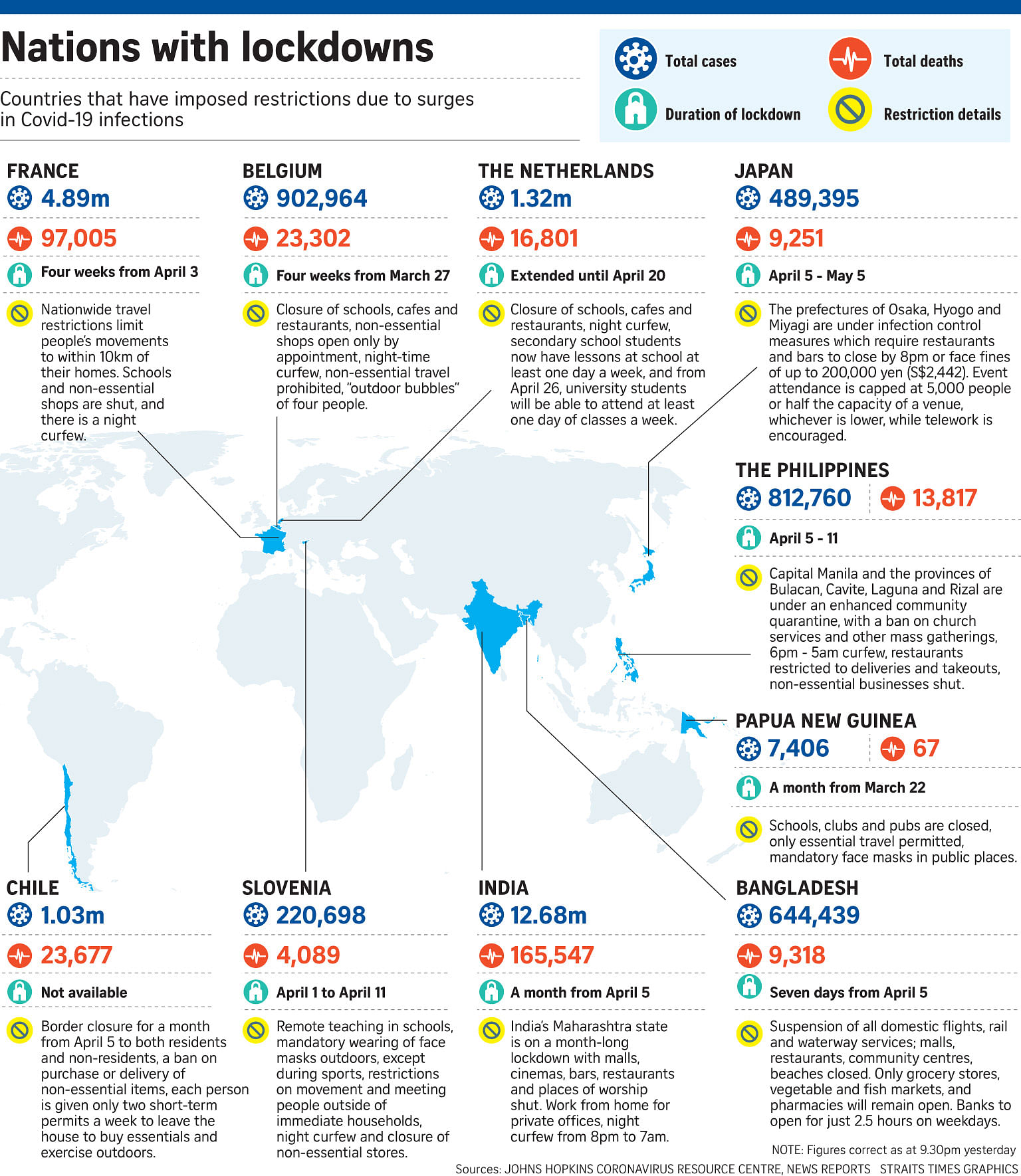Many countries around the world are reimposing restrictions and lockdowns on their pandemic-weary populace as more contagious strains of the coronavirus accelerate the spread of Covid-19.
More than a year after the virus first emerged in China and spread across the globe, sparking lockdowns and movement curbs -and battering the economy - the pandemic has not abated despite more than 673 million vaccine doses having been administered globally.
Covid-19 cases worldwide now total almost 132 million, with 2.8 million deaths, according to Johns Hopkins Coronavirus Resource Centre.
"We face the biggest test of our generation," International Monetary Fund managing director Kristalina Georgiev said last week. "What we do now will shape the post-crisis world."
The threat of the coronavirus is especially acute in Europe, which is reeling from spiralling cases - driven mostly by the B117 variant since summer last year - as it struggles with its vaccine drive, forcing many governments to reimpose unpopular movement curbs.
France, Belgium, the Czech Republic, the Netherlands, Slovenia and Ukraine are currently on lockdown, with restrictions such as stay-home orders, travel bans, night curfews, limits on meeting people from other households, closure of non-essential stores and homeschooling.
The lockdowns have encountered resistance from the public, which is suffering from Covid-19 fatigue, while businesses are struggling to stay afloat.
Protests against government restrictions were reported in Germany, Austria, Britain, Finland, Romania and Switzerland.
The demonstrations had forced Germany to make a U-turn on a plan to impose harsher lockdowns ahead of the Easter holiday, a day after announcing it, with Chancellor Angela Merkel taking the blame for the decision.
The warm spring weather has also driven people to break restrictions and social distancing rules, with many flocking to beaches and attending illegal parties - pictures on social media show packed crowds and people without face masks.
Cognisant of the toll of lockdowns on people and the economy, some European countries are easing restrictions even as new infections and fatalities climb.
Greece allowed non-essential small shops to reopen from Monday, but only for online ordering and pickup, and appointment-only in-person shopping.
Similarly, Portugal further eased restrictions on Monday, allowing cafe and restaurant terraces, museums, non-food markets and fairs, small shops, middle schools and gyms to open their doors. Cinemas, malls and other non-essential businesses are set to reopen in two weeks.
Hungary - with one of the highest Covid-19 mortality rates in the world - is set to shorten a night-time curfew this week and allow shops to open until 9.30pm.
England, which has outpaced its European counterparts in doling out vaccines and has seen infections falling, will come out of its lockdown next Monday, with shops, gyms and outdoor hospitality areas allowed to resume operations.
Across the Atlantic, the Americas are also fighting hard to tamp down surging infections with lockdowns. A third wave is rippling across Canada as Covid-19 cases breached the one million mark, prompting the provincial governments of Ontario, Quebec and British Columbia to impose varying degrees of lockdowns.
The United States, the worst hit in the world, has come a long way since a year ago when it entered strict lockdown. Its pace of vaccination has picked up, allowing more businesses to open as long as capacity limits are imposed and the use of masks in public is enforced.
From January to early last month, the US recorded a drop in the average number of new Covid-19 cases, deaths and hospitalisations, but the number of daily new cases has started creeping up since the middle of last month.
As more states ease control measures, US Centres for Disease Control and Prevention director Rochelle Walensky has warned that if the nation does not take the correct actions, it will be headed for an "avoidable surge, just as we are seeing in Europe right now".
In South America, Brazil is the epicentre of the region's latest epidemic, fuelled by the P1 variant of the virus. Neighbouring Chile last week closed all its borders for a month, Bolivia sealed its frontier with Brazil for a week from last Friday, and Ecuador declared a 30-day "state of exception" - an emergency measure - in eight of its provinces.
Although Asia has managed the Covid-19 situation better, several countries are now grappling with flare-ups, and some are going back to tough restrictions.
India, which has the third-highest number of cases after the US and Brazil, is facing record-level infections, largely driven by cases in Maharashtra state. The state imposed a lockdown on Monday, with non-essential services shuttered, a night curfew, and workers asked to work from home.
There are worries that more lockdowns will be imposed across India, as five states are in the middle of local elections, while hundreds of thousands of people are gathering daily on the banks of the Ganges River in the northern state of Uttarakhand for the Kumbh Mela pilgrimage.
Bangladesh is also on a seven-day nationwide lockdown that began on Monday and includes movement restrictions and closure of non-essential businesses.
In Japan, rising cases have sparked fears of a fourth wave of the coronavirus. As a result, the authorities have imposed infection control measures in Osaka, Hyogo and Miyagi prefectures until May 5.
Surging infections have also prompted Thailand and the Philippines to impose curbs.
Philippine President Rodrigo Duterte has extended a lockdown in capital Manila and nearby provinces by a week until next Sunday.
In the Thai capital, Bangkok, entertainment venues in three districts were ordered closed from yesterday to April 19.
China has mostly tamed the virus, but recently imposed a one-week lockdown on the city of Ruili in Yunnan province, which borders Myanmar, after six Covid-19 cases were reported on March 31. The lockdown, the first in months, is set to end today.
Moving forward, the pandemic will continue to pose a threat to countries' economic growth as they struggle to rein in the virus.
A McKinsey global survey last month noted that weak demand continues to "threaten corporate growth and the pandemic remains the biggest risk to growth".





